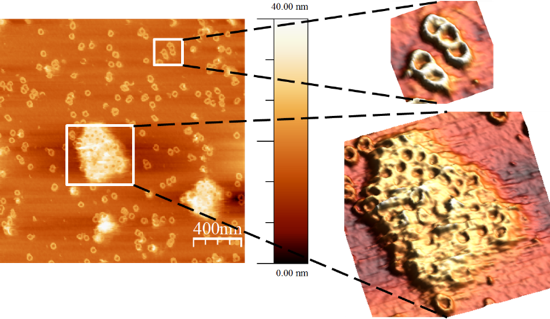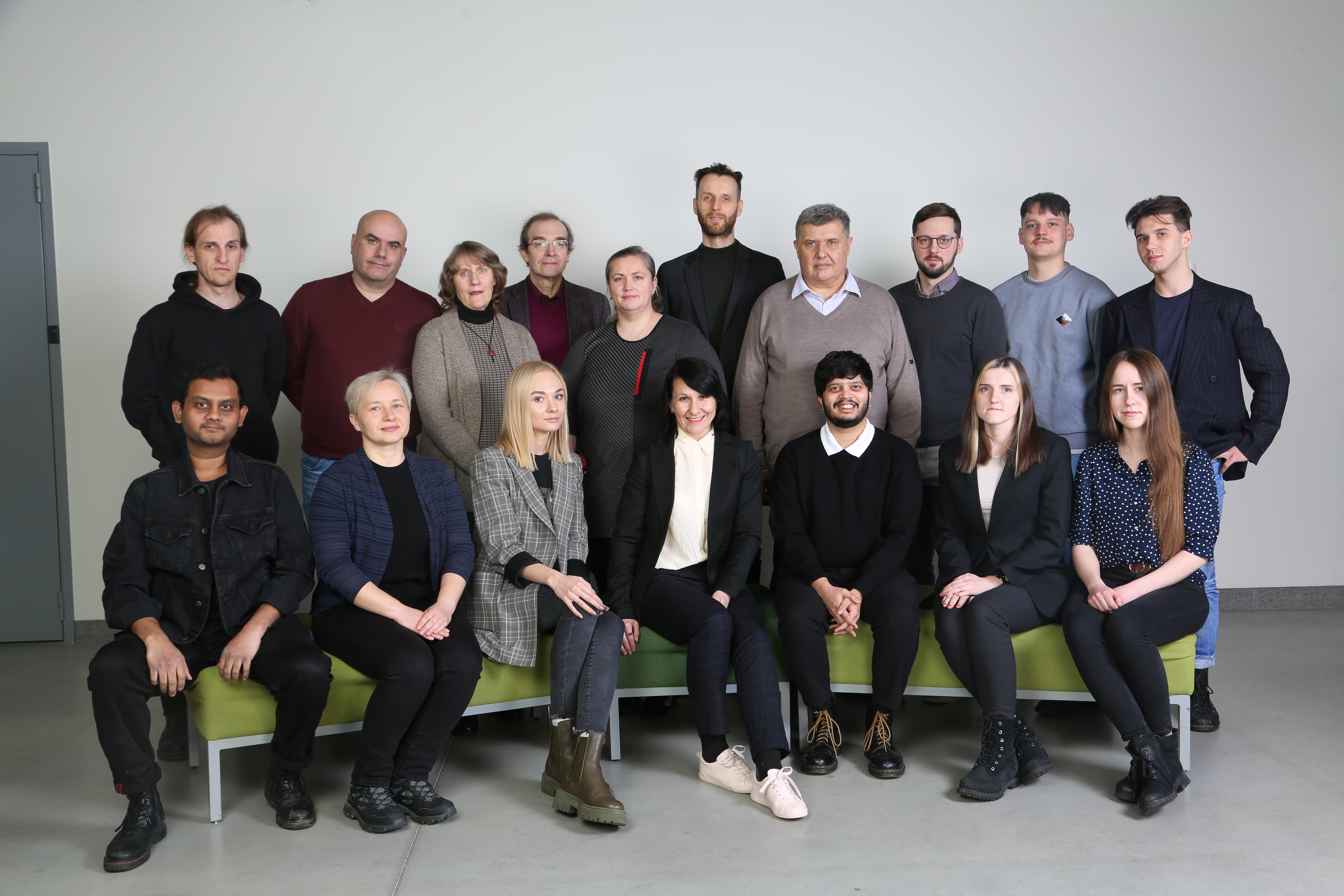Contacts: 4th floor C wing.
Life Sciences Center, Sauletekio av. 7, LT-10257, Vilnius
Twitter: @BiomembranesLSC
About
Formation of plasma membrane is considered as a crucial event during evolution and life, as known today, would not be possible without them. Actual plasma membranes contain a complex, heterogeneous distribution of lipids and membrane proteins which interact to create important biological functions. To investigate this complex membrane environment significant progress has been made to model native membranes.
Our research group focuses on development of nature inspired models, in particular, surface tethered phospholipid membranes (tBLM) and membrane-protein complexes exhibiting catalytic activities. The group addresses problems related to basic life-science as well as applications in biomedicine. In particular, including sensor development for various endogenous and exogenous pathogens and ultrasensitive detection of microbial toxins (α-hemolysin (αHL), Vaginolysin (VLY), Pneumolysin (PLY), etc.).

We offer a broad spectrum of technological solutions to reconstitute proteins into the tethered bilayer for structural and functional studies. Bioelectrochemical and Biospectroscopic techniques and relevant expertise can be accessed by the external users through the standard open access procedures implemented at Vilnius University. We seek both academic and industrial partnerships to further develop molecular devices based on tethered bilayer technologies and advance basic knowledge in the field of the protein function in biological membranes. In particular, we seek to establish partnerships with theoretical groups having expertise in modelling structures of biomolecules in membranes as well as predicting the dynamic properties of ion carriers in confined nano-compartments. Also, we aim to spread our technological knowledge into the areas of biochemistry and molecular biology where the phospholipid milieu is required for functional reconstitution of membrane proteins for structural and functional studies. Joint initiatives for EU and other international funding for research and technology development are also sought-after.
 Our resources contain proprietary technology and compounds for the production of the self-assembled molecular anchors and tethered phospholipid bilayers. Wide spectrum of electrochemical and spectroscopy instrumentation for molecular level characterization of the structure and function of phospholipid bilayers, membrane-protein interaction, detection of membrane-damaging toxins and surface visualization by the fluorescence and atomic force microscopies. Proprietary algorithms and software for the analysis of the electrochemical impedance response of tethered bilayers.
Our resources contain proprietary technology and compounds for the production of the self-assembled molecular anchors and tethered phospholipid bilayers. Wide spectrum of electrochemical and spectroscopy instrumentation for molecular level characterization of the structure and function of phospholipid bilayers, membrane-protein interaction, detection of membrane-damaging toxins and surface visualization by the fluorescence and atomic force microscopies. Proprietary algorithms and software for the analysis of the electrochemical impedance response of tethered bilayers.
Main Grants
- Research council of Lithuania grant "Advanced Technology Development Program" project, B-38, AMILOIDE. (2008-2010). Project partners: LSMU Institute of Biomedical science, LSMU Neurological clinic, Institute of Biotechnology, Institute of Chemistry, Institute of Physics. (Project leader dr. G. Valinčius).
- Research council of Lithuania grant MIP project, MIP-11395, IMFABITE (2011-2012). Immobilized phospholipid bilayers for protein reconstitution. (Project leader dr. G. Valinčius).
- Research council of Lithuania grant National research programme "Chronic Non-Infectious Diseases" project, LIG-12048, MALPALMA (2012-2014) (Project leader: dr. R. Morkūnienė).
- MINIFOB funded by European Social Fund Agency, “Miniaturized phospholipid biosensors” (2013-2015), (Principal investigator: dr. G. Valinčius).
- Biosentox (2017-2019) “Biosensors for toxin detection” funded by VU and Lithuanian business support agency (Principal investigation – G. Valinčius).
Personnel
Head of department
Dr. Rima Budvytytė
senior research fellow
852234394
rima.budvytyte@bchi.vu.lt
Research staff
| Habil. dr. Gediminas Niaura chief research fellow gniaura@ktl.mii.lt |
Dr. Giulio Preta senior research fellow 852234402 giulio.preta@gmc.vu.lt |
Dr. Martynas Talaikis research fellow 852234400 martynas.talaikis@gmc.vu.lt |
| Dr. Marija Jankunec research fellow 852234400 marija.jankunec@bchi.vu.lt |
Dr. Tadas Ragaliauskas research fellow 852234401 tadas.ragaliauskas@bchi.vu.lt |
Dr. Božena Pavliukevičienė research fellow 852234401 bozena.pavliukeviciene@gmc.vu.lt |
|
Dr. Tomas Sabirovas |
PhD students
| Rūta Bagdonaitė | Evelina Jankaitytė | Aida Katkauskaitė |
| Artūras Polita | Rimgailė Tamulytė |
Ozlem Cinar Zeynep
|
Technical staff
| Dr. Arūnas Bulovas biochemist 852234402 arunas.bulovas@bchi.vu.lt |
Danutė Kurečkienė technician danute.kureckiene@bchi.vu.lt |

